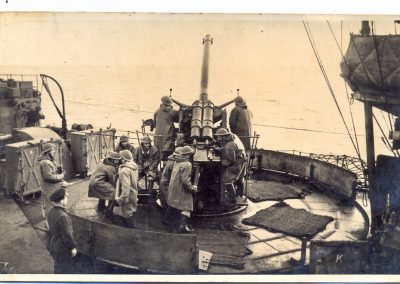The following summary has been written by volunteer researcher, Peter Szypko.
Kazimierz Szypillo was born in the small village of Bobrowszczyzna near Glebokie in eastern Poland on 14 March 1923. His village and Aleksander Szypko’s were ten miles apart. Although the area is now part of Belarus, it was then the 2nd Polish Republic, in an area known as Kresy Wschodnie (Eastern Borderlands). Unlike Aleksander, he was ethnically Polish and worked on his father’s farm from the late 1930s.
The Soviet Union’s invasion of Poland on 17 September 1939 resulted in Kazimierz’s arrest in April 1940 by the Soviet police (NKVD) for a trumped-up charge of “smuggling” in Glebokie. He was branded an ‘enemy of the state’. Only two weeks after his seventeenth birthday, he was imprisoned at the notorious former monastic building in Berezwecz on the outskirts of Glebokie where it was estimated that 2,000-3,000 Polish citizens were killed. Many inmates described the conditions as worse than those in the gulags (state labour camps). He was then transported to a gulag in Sterlitamak in Southern Russia and sentenced to hard labour. In December 1941, after twenty months in captivity, he was released under the terms of Stalin’s ‘amnesty’. He then probably worked in a kolkhoz (collective farm) at one of the Soviet republic countries in Central Asia. This was in order to recover from his ordeals and ensure he was medically fit to enlist in the Polish Army now forming in Russia.
Kazermierz enrolled in the Polish Army 8th Division 24th Regiment in Czok-Pak (Kyrgyzstan), Central Asia, under General Wladyslaw Anders in March 1942. He evacuated from Russia with the Regiment, sailing across the Caspian Sea from Krasnovodsk to Pahlevi in British-controlled Iran in late March 42. The cargo ship they sailed on was storm damaged and drifted for three days before being rescued. Having volunteered to join the Polish forces in Great Britain, he travelled to England along with, among others, Aleksander Szypko, stopping in Palestine, Egypt and South Africa en route. Arriving in Liverpool in March 1942, he opted to join the Polish Navy whilst stationed at Auchtertool, Scotland.
He served in the Polish navy on the destroyer ORP Piorun from September 1942 to August 1946. Having received training and specialising in electrical engineering, he was promoted to the rank of Able Seaman in 1943. He took part in many important World War 2 campaigns and battles included Arctic convoys 1943, Atlantic Convoys from 1943 to 1945, the Allied landings in Italy and Sicily in 1943, the Allied D-day landings in Normandy in 1944 and the Battles of Ushant and Jersey later in June 1944. He was awarded five British medals – the 1939-1945 Star, Atlantic Star, Italy Star, Arctic Star, the France & Germany clasp and War medal. He was also decorated with the Polish Sea medal (Morski) and bar.
Although he had not joined the ship at the time, Kazimierz would have been aware of the Piorun’s legendary status, having traded fire with the colossal German battleship, Bismarck, in May 1941 in a true ‘David and Goliath’ encounter. It was the first allied warship on the scene before the rest of the fleet arrived to complete the destruction of the enemy ship.
From the time the ORP Piorun was demobilised in August 1946, Kazermierz was based at the Okehampton Naval Camp on a number of occasions. These included a period from August to November 1946 when it was still a training and reserve camp and from April to August 1947 after it had transformed into a Resettlement Centre for those who wished to remain in the country. He had enlisted in the Polish Resettlement Corps from March 1947.
In late 1947, he moved to Exeter, where he remained for the rest of his life working mainly as a scaffolder on building sites. He married an English lady, and together they had two sons. Kazimierz Szypillo died in 2011.


